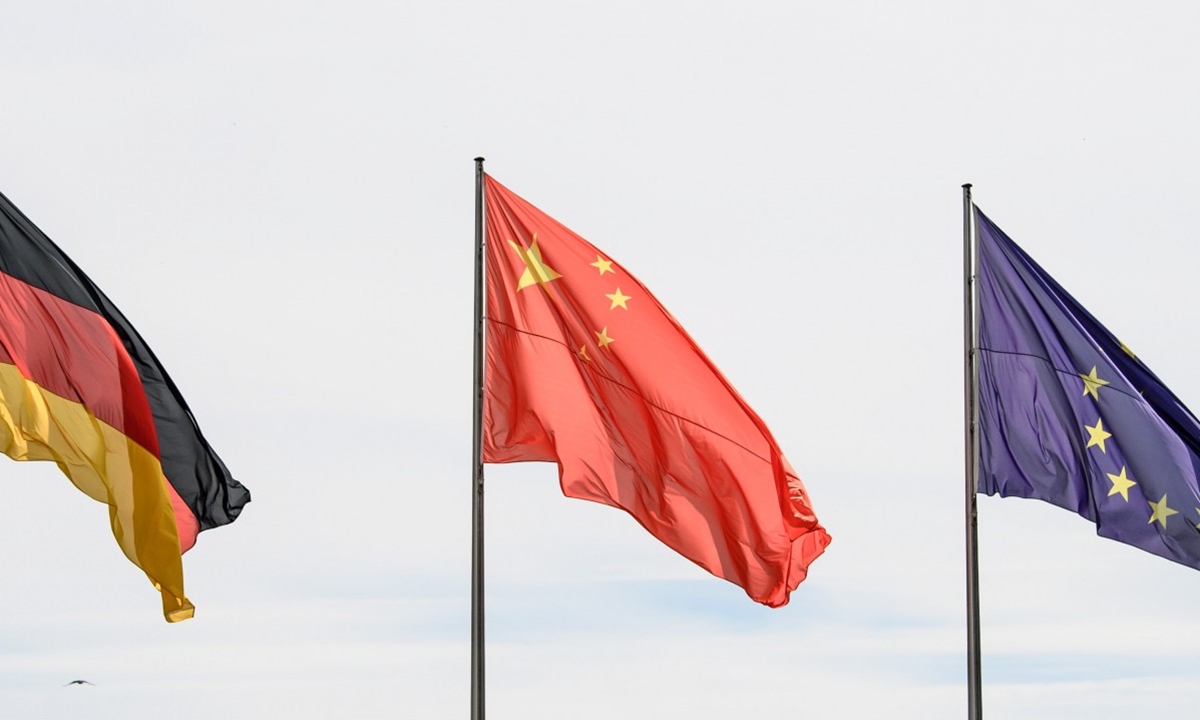China-Europe bond can withstand US meddling: Global Times editorial
Source: Global Times Published: 2020/9/13 21:53:40

File photo: People's Daily
A China-Germany-EU leaders' meeting via video link will be held on Monday. Some mainstream US media outlets are attempting to court attention by raising their voices to badmouth China-Europe ties, roping in Europe's public opinion and drawing it closer to the US' side.Just like politicians in Washington, those US media spared no effort in hyping up and exaggerating the ideological differences as well as economic and trade frictions between China and Europe, emphasizing the so-called fundamental divergences between Beijing and Brussels, and instigating Europe to be tough on China.
However, the ideological differences between China and Europe are long-term issues. Both sides have met bumps on the path of interactions with each other and have formed a tacit mutual understanding in managing divergences. Economic and trade frictions come with the expansion of cooperation. Both sides are jointly committed to resolving them. A China-EU bilateral investment agreement is under intense negotiations. When it is reached, it will be the best response to quiet all the noise on bilateral ties.
The intensifying strategic game between China and the US has shaped new conditions for Europe's external strategic space. It is impossible for Europe to completely take the US' side as it is not in the interests of the Europeans. No matter how hard US politicians and media have tried, they cannot turn the EU into a new member of the Five Eyes. There is no need for Chinese people to be anxious, as Europeans will find their balance between China and the US.
No matter how high-profile European public opinion addresses the so-called human rights issues under pressure from the US, the biggest European geopolitical theme is to maintain the continent's independence.
Both China and Europe are advocates of multilateralism. China supports Europe strengthening its strategic autonomy and could coordinate with Europe when it comes to the part related to China during the process.
Washington, on the other hand, is a strong opponent of Europe in this regard. All it wants is an obedient Europe which is accustomed to US hegemony.
US President Donald Trump has expressed his dissatisfaction with Germany on several occasions. The US coerced Germany on 5G and the Nord Stream 2 gas pipeline, regardless of the interests of Germany and Europe. These are fundamental conflicts - their impact on the lives of Europeans is far more than that from Hong Kong and Xinjiang affairs.
China-Europe relations are complex, because there are many contradictions and conflicts. In particular, ideology-driven forces in Europe are quite active. They want to show their presence in China affairs and would make troubles.
On the other hand, this relationship is simple, because Europe has no other option except for strengthening pragmatic cooperation with China. Despite all the fuss, Europe will keep expanding cooperation with China.
The Chinese people must be firm on China-Europe relations and should not be led by the nose by US doomsayers. Europe has expressed some stances that can be viewed as tough toward China. Besides its true intentions, it needs to follow the general trend in the West and stage a show so it can bargain with China. Europe's hard stance toward China has strategic limitations.
China has never thought of influencing or reshaping Europe by taking advantage of its rising power. Meanwhile, Europe will not put its interests in reshaping China above its own development interests. There is no serious geopolitical conflict between the two. Europe's ideological push against China is in essence different from the US moves - the US is making ideology into a main battlefield of its strategic suppression of China.
We believe China-Europe cooperation will march forward. This will not change with the will of some Europeans who are rigidly loyal to the US. Chinese society should adapt to the new complexities in China-Europe relations and be patient of their in-depth competition. Tolerance should be the choice of both China and Europe.
Posted in: EDITORIAL